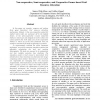Free Online Productivity Tools
i2Speak
i2Symbol
i2OCR
iTex2Img
iWeb2Print
iWeb2Shot
i2Type
iPdf2Split
iPdf2Merge
i2Bopomofo
i2Arabic
i2Style
i2Image
i2PDF
iLatex2Rtf
Sci2ools
IPPS
2006
IEEE
2006
IEEE
Non-cooperative, semi-cooperative, and cooperative games-based grid resource allocation
In this paper we consider, compare and analyze three game theoretical Grid resource allocation mechanisms. Namely, 1) the non-cooperative sealed-bid method where tasks are auctioned off to the highest bidder, 2) the semi-cooperative n-round sealed-bid method in which each site delegate its work to others if it cannot perform the work itself, and 3) the cooperative method in which all of the sites deliberate with one another to execute all the tasks as efficiently as possible. To experimentally evaluate the above mentioned techniques, we perform extensive simulation studies that effectively encapsulate the task and machine heterogeneity. The tasks are assumed to be independent and bear multiple execution time deadlines. The simulation model is built around a hierarchical Grid ucture where machines are abstracted into larger computing centers labeled “federations,” each of which are responsible for managing their own resources independently. These federations are then linked togethe...
Distributed And Parallel Computing | Game Theoretical Grid | IPPS 2006 | N-round Sealed-bid Method | Sealed-bid Method |
| Added | 12 Jun 2010 |
| Updated | 12 Jun 2010 |
| Type | Conference |
| Year | 2006 |
| Where | IPPS |
| Authors | Samee Ullah Khan, Ishfaq Ahmad |
Comments (0)

